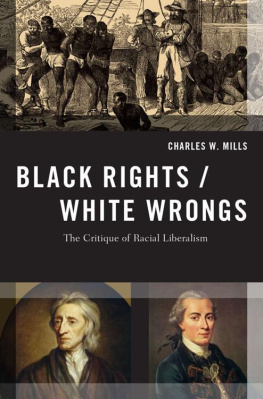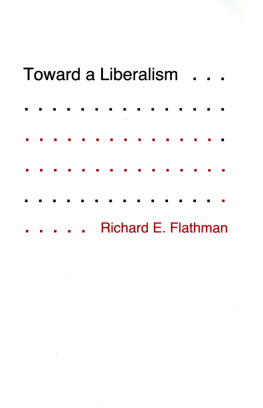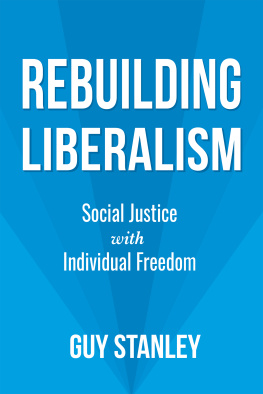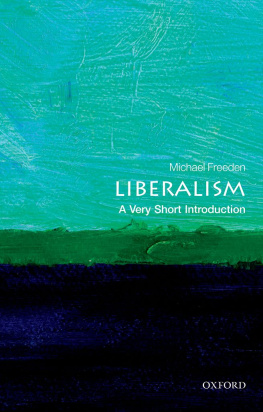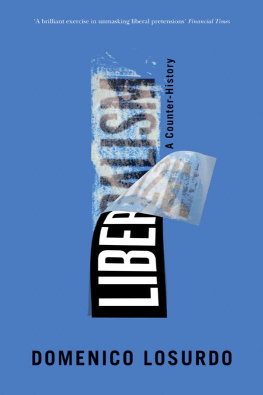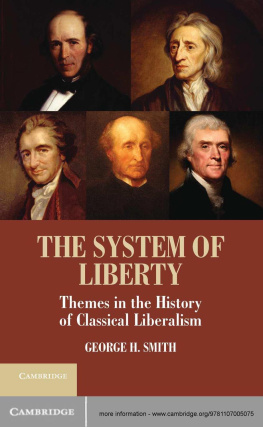WHY LIBERALISM FAILED

Published with the assistance of the Institute for Advanced Studies in Culture, University of Virginia.
Copyright 2018 by Patrick J. Deneen.
All rights reserved.
This book may not be reproduced, in whole or in part, including illustrations, in any form (beyond that copying permitted by Sections 107 and 108 of the U.S. Copyright Law and except by reviewers for the public press), without written permission from the publishers.
Yale University Press books may be purchased in quantity for educational, business, or promotional use. For information, please e-mail sales.press@yale.edu (U.S. office) or sales@yaleup.co.uk (U.K. office).
Set in Janson type by IDS Infotech, Ltd.
Printed in the United States of America.
Library of Congress Control Number: 2017937443
ISBN 978-0-300-22344-6 (hardcover : alk. paper)
A catalogue record for this book is available from the British Library.
This paper meets the requirements of ANSI/NISO Z39.48-1992 (Permanence of Paper).
10 9 8 7 6 5 4 3 2 1
To Inge
The gap between medieval Christianitys ruling principle and everyday life is the great pitfall of the Middle Ages. It is the problem that runs through Gibbons history, which he dealt with by a delicately malicious levity, pricking at every turn what seemed to him the hypocrisy of the Christian ideal as opposed to natural human functioning....
Chivalry, the dominant idea of the ruling class, left as great a gap between ideal and practice as religion. The ideal was a vision of order maintained by the warrior class and formulated in the image of the Round Table, natures perfect shape. King Arthurs knights adventured for the right against dragons, enchanters, and wicked men, establishing order in a wild world. So their living counterparts were supposed, in theory, to serve as defenders of the Faith, upholders of justice, champions of the oppressed. In practice, they were themselves the oppressors, and by the 14th century the violence and lawlessness of men of the sword had become a major agency of disorder. When the gap between ideal and real becomes too wide, the system breaks down. Legend and story have always reflected this; in the Arthurian romances the Round Table is shattered from within. The sword is returned to the lake; the effort begins anew. Violent, destructive, greedy, fallible as he may be, man retains his vision of order and resumes his search.
BARBARA TUCHMAN , A Distant Mirror: The Calamitous 14th Century
Contents
Foreword
The Yale University Press series Politics and Culture begins with the premise that self-government, the hallmark and glory of the United States, the West, and an expanding number of countries around the world, is ailing. Those who sense the ailment cannot agree on what it is, much less how it is to be treated; and that disagreement, only deepening as time passes, is in fact part of the ailment. In the young twenty-first century, liberal democracy, that system that marries majority rule with individual rights, has entered a crisis of legitimacy. As practiced in recent decades, and as an international ordering principle, it has failed to deliver on its promises to growing, and increasingly mobilized and vocal, numbers of people.
The symptoms of this ailment are easy to observe: an increasing skew in the distribution of wealth; decay in traditional institutions, from civic associations to labor unions to the family; a loss of trust in authoritypolitical, religious, scien-tific, journalisticand among citizens themselves; growing disillusionment with progress in effecting equal justice for all; above all, perhaps, the persistent and widening polarization between those who want increasingly open and experimental societies and those who want to conserve various traditional institutions and practices. The fragmentation not only continues but deepens. As people sort into new social and political tribes, electoral results confound and alarm experts and further widen polarization. W. B. Yeatss line the center cannot hold applies in our fractured societies as much as it did when he wrote it a century ago. In the age of Trump, it is not even clear where the center is or how we might rediscover and reoccupy it.
Patrick Deneens Why Liberalism Failed, the second book in this series, locates the source of the legitimacy crisis in liberalism itself. By liberalism, Deneen has in mind not the narrow definition of popular American discourse, namely progressive big government or caring government (depending on your point of view). He means the broader conception familiar to political philosophers, the set of principles upon which liberal democracies the world over are built. Why Liberalism Failed pulls together a number of strands of discontent about liberalism today, strands found in academic, political, and popular discourse. The result is a bold and far-reaching critique of the root liberal assumption, associated with the Enlightenment philosopher Immanuel Kant, of individual autonomy. We use the root metaphor deliberately: Deneens is a radical critique, arguing that liberalism needs not reform but retirement. The problem is not that liberalism has been hijacked but that its elevation of individual autonomy was wrong from the start, and the passage of decades has only made its error more evident.
Scholars have launched radical critiques of liberalism before. From the left have come broadsides from Marx and his progeny, including the Frankfurt School, and from postmodern thinkers such as Foucault. From the right have come attacks from Nietzsche, Schmitt, and traditionalists in the Catholic Church and other religious institutions. From a location difficult to pinpoint have come onslaughts from Milbank and Hauerwas. Such critiques inevitably provoke strong reactions from other scholars and intellectuals. Radical critiques are designed to do thatto disrupt the dominant discourse and challenge its routine absorption and redirection of critique, so that people will think more fundamentally about existing political, social, and economic institutions and practices.
Readers of all sorts will find that Why Liberalism Failed challenges not only their thinking but many of their most cherished assumptions about politics and our political order. Deneens book is disruptive not only for the way it links social maladies to liberalisms first principles, but also because it is difficult to categorize along our conventional left-right spectrum. Much of what he writes will cheer social democrats and anger free-market advocates; much else will hearten traditionalists and alienate social progressives. Some of these readers nonetheless will be tempted to place the book in one or another familiar category, the better to manage and perhaps dismiss its critique. They should resist that temptation, which is itself a symptom of our polarized times and perhaps the chief reason why Deneens argument is precisely the kind we most need to hear now.
James Davison Hunter
and John M. Owen IV, Series Editors
Preface
This book was completed three weeks before the 2016 presidential election. Its main arguments matured over the past decade, before Brexit or President Trump was even conceivable. My basic assumption was that the underpinnings of our inherited civilized ordernorms learned in families, in communities, through religion and a supporting culturewould inevitably erode under the influence of the liberal social and political state. But I anticipated that liberalism would relentlessly continue replacing traditional cultural norms and practices with statist Band-Aids, even as a growing crisis of legitimacy would force its proponents to impose liberal ideology upon an increasingly recalcitrant populace. Liberalism would thus simultaneously prevail and fail by becoming more nakedly itself.
Next page

